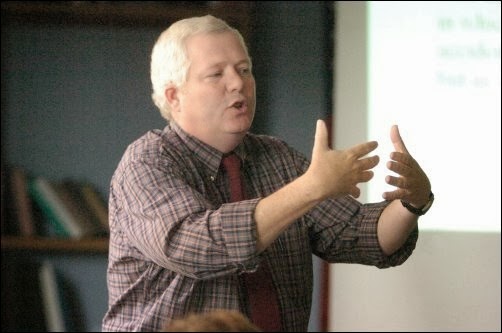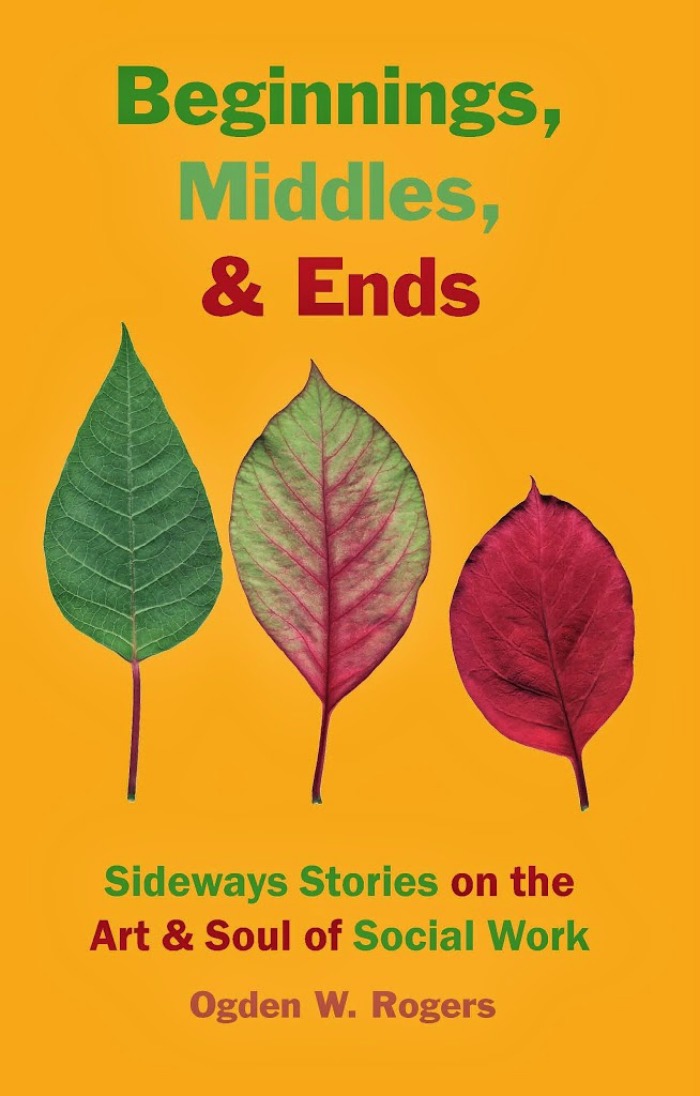Are you wondering what it’s like to be a social worker? Or if you are a social worker, wouldn’t it be nice if there were a book that could make you feel understood, give you advice and/or make you laugh?
Beginnings, Middles, & Ends: Sideways Stories on the Art & Soul of Social Work by Ogden W. Rogers is a rather unique book that seems to address all of these needs 🙂
As the title suggests, Ogden (2013) shares many tales, anecdotes and lessons from his career journey into social work. This includes how he chose to become a social worker, the jobs he had while studying to become one, the various positions he held working with inpatients and/or outpatients at hospitals/mental health clinics etc., as well as his pursuit of a Ph.D. and experience teaching social work students.
The book has four main sections [each of which has many different stories]:
- Beginnings
- Middles
- Dialogs of Hanna
- Ends
One wonderful example of both Ogden’s creative working style and the problem-solving approach that social workers often face in their day-to-day lives is brought to life when he is presented with Frank, an inpatient client suffering from dementia, who has become more confused and difficult with the staff, as his illness as progressed.
Below is an excerpt from Beginnings, Middles & Ends:
“In the course of doing the history, I learned that Frank had been a custodian at an elementary school for the last 15 years of his work life… mostly he enjoyed the quiet of the hallways when children were in their classrooms and he would, as he said it, “push my broom.”…
Carmela was the housekeeper on the GeroPsych floor… I asked her if if I could borrow a push broom so that Frank could mop the hall…
After a brief orientation to the requirements and boundaries of the ward, Frank was off to his assignment dressed in the hospital issue bathrobe and slippers… He swept the floor about five times before lunch. In all of that time, he stayed to the task. He would smile a small smile and his attention to the nursing staff was reduced to just small cordial “good mornings” as he went up and down the hallway…”
Soon after this successful intervention, Mr. Baccardi, the head of housekeeping, learned what Ogden had done and immediately instructed him that Frank may no longer use the department’s broom. However, Ogden did not give up. He ultimately found a way to convert the tool to that of the occupational therapy department so that once Mr. Baccardi made his rounds again, he was able to say:
“We don’t have a problem, Mr. Baccardi,” I noted, handing the brightly festooned janitorial tool to him. “See right there. Painted in red. That’s not housekeeping equipment. That’s Occupational Therapy tool number 7. I won’t ever let a patient use housekeeping equipment again. I promise.”
As so vividly portrayed in the above illustration, Ogden has demonstrated traits he is inherently recommending we all develop as social workers:
- empathy
- respect for the client
- the ability to effectively serve as a conduit between the individual and society
- the need to ask the right [or enough] questions
- resourcefulness and determination.
To conclude, I found Beginnings, Middles, & Ends a most enjoyable and inspiring reading about life as a social worker. Ogden skillfully injects nearly every story with humor and/or an innovative approach to a dilemma. Both new and experienced social workers have much to gleam from his work.
There was one minor addition that I felt could have been beneficial for those who are new to the social work profession.
Currently, the reader must figure out on his/her own many of the lessons to be drawn from Ogden’s stories. I think that had the author added a chart or two summarizing some of the key lessons he had learned over the years [albeit in an amusing manner], this would have been a valuable supplement.
And now, I’d like to switch over the mike, so to speak, to the author, Ogden Rogers, whom I had the honor and pleasure to interview below.
 Ogden Rogers, Ph.D., LCSW
Ogden Rogers, Ph.D., LCSW
Odgen: In many of the stories you shared, I was struck by the degree of creativity, detective work and/or “jack of all trades” approach that you needed to employ in order to successfully help some clients. Do you think this degree of innovation, flexibility and/or gumshoe effort is required in all social work settings?
I’m a “committed generalist” and, as such, I’ve really taken to heart that social work is a “Person-in-Environment” profession. For me, this means that empowering folks and being a creative problem solver is rooted in “beginning where the client is at.”
I think this demands personal flexibility and understanding the need to “leap barriers in a single bound” when it’s clearly in the client’s interest. Social Work for me is the profession that does not get stuck into disciplinary boxes.
We are the people who are willing to “join in the middle” of any situation. This doesn’t mean we don’t respect boundaries, rules, limits, and such- but it does mean that as “masters of boundaries” we know when and where to think about how to surmount them.
I think all good social workers embrace innovation, and have a real respect for “the bi-focal vision”. Good clinical “micro” practitioners engage policy that affects their clients. Good organizers-“macro” practitioners know they have to use all their sensitive individual-people skills in the right situations.
At one point, you mention that there is the “need to keep secrets from the people you love. This can be tough for you, and for them.” Would you elaborate on what you meant by this and what advice you would offer to social workers in order to address this difficulty?
There are facts in the confidential relationship with a client that belong no other place except within that relationship. Despite their weight on the worker’s self, some details just cannot be shared.
This means that some “stuff” just can’t be shared with lovers or partners or spouses. This can mean that one’s “professional relationship” has secrets from one’s “personal relationships”. I think this can be a hard thing sometimes in personal relationships.
I think there are two ways to try and mitigate this: First, I think social workers need to explain to their personal relationships, the demands and nature of their social work practice and the need to afford and protect their clients’ confidential privilege.
Secondly, I think it is key that workers develop good supervisory or peer consultation relationships that can allow for the extension of client privilege within a professional “need-to-know” context. This can allow for professional support and growth for the practitioner.
You stated: “If others cannot define you, you can define yourself. You can be the artist of your own practice with others.” Would you expand on this idea as to what you had in mind?
This speaks a bit to the demands for innovation and flexibility that I’ve already mentioned above. I’ve worked in a number of environments where the professionals in other disciplines really didn’t know “what social workers do”. This is especially true in environments that are sociologically “owned” by other professions like hospitals, schools, prisons, etc. Rather than get all professionally “wounded” about this, I’ve come to grasp the realization that because social workers are so hard to “box-in” for some, that means we can look around our environments and identify roles and activities that can help meet client needs.
These roles might include elements of “hard-service,” as well as “soft-service” utility to clients, and collateral professionals depending on the unique environment. I like to say that social work is like a windshield on a car- you don’t absolutely need one to drive, but it sure helps keep the bugs out of one’s teeth.
You talk about the importance of “chestnuts” to center us and provide direction with our clients. What are the top 10 chestnuts you would offer to newly minted social workers?
Begin where the client is.
Begin where the client is.
Begin where the client is.
Begin where the client is.
Begin where the client is.
Begin where the client is.
Begin where the client is.
Begin where the client is.
Begin where the client is.
P-I-E! (person-in-environment)
Thanks so much, Ogden, for taking the time to answer a few of our questions about your book!
What are your thoughts about this book and/or the social work profession? Please share your comments below 🙂



I just wanted to say thank you for writing this amazing book that I have just spent the last five hours finishing. It had a tremendous effect on me that I can not even define. Your words of wisdom, especially when it comes to ends, are something that I feel I have been looking for in this field of social work. I come from a family who doesn’t understand the passion and meaning that I feel is behind this deep way of life, and in about 7 1/2 hours of reading your book I feel that I now understand why social work is a way of life. Your words of pain, happiness, tears, smiles and the stuff in between really sparked a part of me that had been questioning if I could make it in this field. I believe that I have never been more prepared to embark on this journey of beginnings, middles, and ends more than I am at this very moment.
Hi Brianna,
Thanks so much for your heartfelt feedback on Ogden’s book. I made sure to email him so that he would hear your deep appreciation.
Best wishes,
Dorlee
Dorlee,
Your review and subsequent interview, offers just the right amount of information to pique one’s interest in this book.
I really like Ogden’s 10 chestnuts – applicable advice for a wide range of people who are agents of change and growth.
Ogden’s approach to working with Frank reminded me of how Milton Erickson would often work with his patients – starting in place with what is known.
Another book added to my reading list. 🙂
Marianna,
Thanks so much for your kind feedback. I’m so glad that you enjoyed the post/interview that you deemed adding Ogden’s book to your reading list 🙂
You are quite right – Ogden’s 10 chestnuts would apply to a whole of host of professions [and would lead to far greater customer/student/patient satisfaction if it were applied].
Warmly,
Dorlee